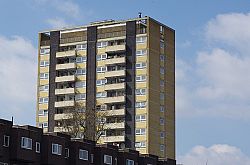

The Welsh government has launched a consultation on the next phase of its building control regime for higher-risk buildings, with a focus on new duties for decision-makers and fresh enforcement powers for local authorities.
The consultation, which closes on 25 May, forms parts of the Welsh government's implementation of the Building Safety Act 2022.
In this phase, it will introduce "a more stringent regulatory regime during design and construction for higher-risk buildings" and changes to the building regulations in Wales.
Among the proposals are:
Proposed changes include details of compliance and stop notices for local authorities, applicable for the design and construction of both non-higher-risk and higher-risk buildings.
Compliance notices require work to be corrected by a certain date, while stop notices mean work that is non-compliant must be stopped until it is compliant again.
The consultation document said: "failure to comply with either notice will be a criminal offence, with a maximum penalty of up to two years in prison and an unlimited fine".
The Welsh government is also planning to introduce requirements for principal contractors and designers to report fire and structural issues during the design and construction phase of higher-risk building work.
Each local authority would then be required to send a summary of these to the government.
The consultation also asked for feedback on responsibilities for dutyholders, classed as the:
as well as competence requirements for anyone carrying out design or building work.
Dutyholders will need to make sure there are systems in place "to plan, manage and monitor both the design work and the building work to ensure compliance with building regulations".
It also suggested that where a local authority is a dutyholder for higher-risk building work, that work should be overseen by an alternate local authority to avoid conflicts of interest.
Potential wider changes include the reform of non-higher-risk building work applications and the automatic lapse of building control approval after three years.
Last year, the Welsh government announced it would be introducing a Building Safety (Wales) Bill into the Senedd before the summer recess, which will focus on the occupation phase, and introduce the role of accountable persons, who will be responsible for assessing and managing building safety risks.
For more information on this subject, see: